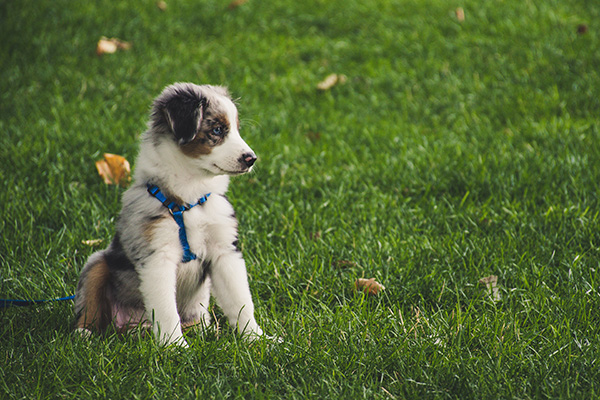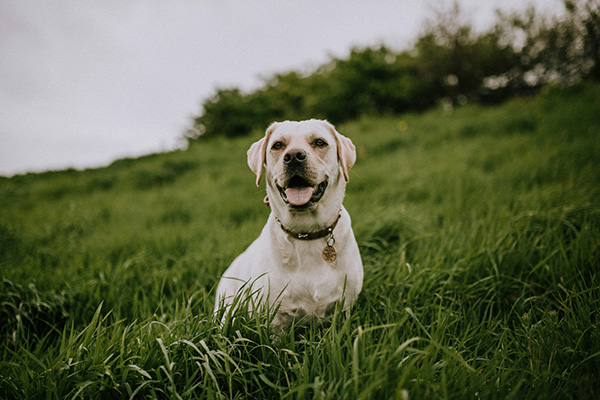Have you ever pondered the reason behind your canine companion's spontaneous decision to graze on your lawn? Seeing a dog eating grass is a common yet curious behavior that perplexes many pet owners. While it might seem odd to us, this habit is quite natural for dogs and has intrigued researchers and veterinarians alike.
This article delves into diverse theories and insights surrounding why your dog eats grass. From instinctual behaviors to dietary needs, we explore the multifaceted reasons that drive this common canine practice. Whether you're a seasoned dog owner or new to the world of pets, understanding this behavior can enhance your perspective on your furry friend's health and well-being.
10 Reasons dogs eat grass
Natural Instinct
This behavior may stem from dogs' evolutionary history. The forebears of present-day dogs, such as wolves, commonly consumed plant matter found in the stomachs of their prey. This ingestion of grass and other foliage was a natural part of the dog's diet, providing essential nutrients and aiding digestion. Thus, when modern dogs eat grass, they may follow an ingrained instinct from their wild ancestors.
Nutritional Needs
Dogs might turn to grass as a source of fiber or other nutrients missing from their diet. Fiber plays a vital role in digestive health by promoting bowel regularity and supporting the overall functioning of the gastrointestinal system. While commercial dog foods are formulated to be nutritionally complete, some dogs may instinctively seek out additional sources of fiber, like grass, to satisfy their dietary needs.
Gastrointestinal Relief
Grass eating is often thought to help dogs relieve gastrointestinal discomfort. The rough texture of grass blades can irritate the throat and stomach lining, potentially inducing vomiting and helping the dog to expel unwanted substances or relieve nausea. However, not all dogs that eat grass vomit afterward, indicating that this might not be the sole reason for the behavior.
Boredom or Anxiety
Dogs that are bored, anxious, or lacking mental stimulation might eat grass as a coping mechanism. This behavior can provide a diversion and a way to occupy time. In some cases, it could also manifest a compulsive behavior, especially in dogs that are left alone for long periods or don't receive enough exercise and mental stimulation.

Taste or Texture Preference
Just as humans have diverse taste preferences, dogs may also enjoy the taste or texture of grass. This preference can vary from one dog to another, with some finding the sensation of chewing grass to be pleasant or satisfying. It's a simple yet intriguing possibility that dogs might just like how grass tastes or feels.
Exploratory Behavior
Dogs are naturally curious creatures; puppies, in particular, often explore the world with their mouths. Eating grass can be part of this exploratory behavior, allowing them to experience different textures and tastes as they learn about their environment. This behavior is generally harmless and often decreases as dogs grow older and become more familiar with their surroundings.
Medicinal Purposes
Some theories suggest that dogs might instinctively consume grass for its potential medicinal benefits. Historically, wild animals are known to eat certain plants to help with internal parasites or digestion issues. Dogs might follow a similar instinct, using grass as a natural remedy for internal discomfort or purging parasites. If your dog is eating grass while showing signs of stomach upset or other symptoms, you must consult your veterinarian.
Habitual Behavior
Once a dog starts eating grass, and if they find the experience either neutral or positive, they might continue to do so out of habit. This habitual behavior can become a regular part of their routine, especially if it doesn't lead to any adverse effects. As with many habits, it may persist simply because it has become a familiar activity for the dog.
Attention-Seeking
Dogs are intelligent animals that adeptly learn how to garner attention from their owners. If a dog notices that eating grass results in attention from their human (even if it's negative), they may repeat the behavior to elicit a response. This is particularly true for dogs that may feel neglected or crave more interaction with their owners.
Enjoyment of Outdoor Activities
For some dogs, eating grass is just one of many enjoyable activities they engage in while outdoors. It could be part of a broader sensory experience that includes smelling different scents, exploring new environments, and tasting various non-harmful plants. The act of eating grass may simply add another layer of enjoyment to their outdoor adventures.
Why Did My Dog Eat Grass and Then Throw It Up?
It can be concerning if your dog ate grass and then throws it up, but it's a relatively common behavior among dogs.
If you're worried about your dog's grass-eating habit, it's advisable to consult with your veterinarian. Here are a few reasons why this might happen:
Natural Instinct for Digestive Aid
Some dogs eat grass as a natural response to feeling unwell. The grass can irritate the stomach lining, and by inducing vomiting, dogs may be attempting to rid themselves of whatever is causing their discomfort. This behavior is believed to be an instinctive way for dogs to aid their digestive system.
Gastrointestinal Upset
If your dog has an upset stomach, eating grass might be its way of dealing with gastrointestinal distress. Dogs don't have many options to alleviate nausea or an upset stomach, and eating grass is a readily available and natural method they might use.
Indigestible Fiber
Grass is largely indigestible for dogs due to its high fiber content. Their stomachs cannot break down grass as efficiently as they do regular food. Consequently, the ingested grass can irritate, prompting vomiting as the body attempts to expel this indigestible material.
Self-Purging
Dogs may instinctively eat grass to purge their system. If they've eaten something that doesn't agree with them or feel a bit under the weather, consuming grass and subsequently vomiting can be a way for them to clear their stomach.
Exploratory Behavior
Sometimes, especially in puppies, eating grass and vomiting could simply result from exploratory behavior. Younger dogs often explore their environment by tasting various things, including grass, which might lead to vomiting if they eat too much or if their stomachs are sensitive to it.

FAQs
Is it safe for my dog to eat grass?
Generally, eating grass is safe for dogs. However, the safety can be compromised if the grass has been treated with chemicals like pesticides or herbicides. Dog owners should ensure that the grass their pets consume is free from such treatments.
Does eating grass mean my dog is sick?
While eating grass can sometimes be a sign of upset stomach dogs, it's not always an indication of illness. Most dogs will nibble on grass here and there, which is normal behavior.
If grass eating is accompanied by other symptoms of sickness, such as lethargy, diarrhea, or vomiting (unrelated to the grass eating itself), it may be time to consult a veterinarian. If. If you are concerned or worried that your dog may be eating too much grass regularly, it's time to visit your veterinarian.
Should I stop my dog from eating grass?
If the grass-eating behavior is occasional and the grass is safe (not treated with chemicals), stopping your dog is usually unnecessary. Nonetheless, if your dog is eating grass excessively or ingesting potentially harmful varieties, it's prudent to discourage the behavior and seek advice from your veterinarian.
Can eating grass cause harm to my dog?
While generally safe, eating grass can sometimes lead to problems like choking, especially if the dog eats too much or too quickly. There's also a small risk of intestinal blockage from grass, particularly in smaller breeds or if the grass is coarse.
How can I prevent my dog from eating grass?
To prevent your dog from eating grass, try to keep them engaged with other activities or provide alternative chewing options like toys or safe treats. Maintaining a balanced diet and scheduling regular veterinary check-ups can also address this behavior.
What alternatives can I provide to my dog instead of grass?
Providing safe chew toys and dental treats or engaging in more playtime can be good alternatives. These options can satisfy your dog's chewing instinct, provide mental stimulation, and prevent boredom, reducing grass-eating behavior.
